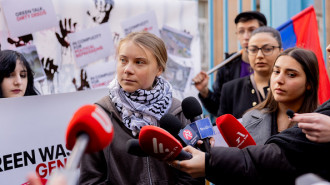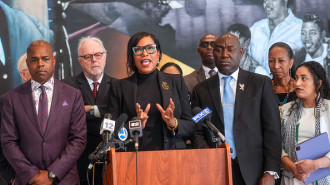UN approves arms embargo against Yemen rebel leaders
The United Nations Security Council voted on Tuesday to pass a resolution demanding that Houthi rebels pull out of territory seized during the ongoing conflict in the country.
The resolution, tabled by Jordan on behalf of Gulf states, also authorises an arms embargo and sanctions against the Houthi leader Abdelmalik al-Houthi and Ahmed Ali Saleh, son of former president Ali Abdullah Saleh, who is allied to the Houthis.
In addition to this, the resolution calls for the Houthis to stop recruiting child soldiers, and to free political prisoners, including the defence minister, Mahmoud al-Subaihi.
The resolution was carried 14-0, with only Russia abstaining. It was feared that the Russians may use their veto, and they had called for an arms embargo to be implemented against all parties in the conflict.
An Arab diplomat at the UN told al-Araby al-Jadeed that Arab countries were working on a response to the Russians.
“There is an Arab position being formed towards Russia,” the diplomat said. “Moscow is placing relations with Iran ahead of its relationship with the Arab states.”
A Saudi-led coalition has bombarded Houthi & Saleh positions with airstrikes across Yemen since March 26, with the Houthi-Saleh forces continuing their advance across the country, moving south to Aden and east to Shabwa.
The Saudis say that they airstrikes are in support of Yemen's president Abd Rabbo Mansour Hadi, who has fled the country to Riyadh.
The resolution makes no mention of humanitarian pauses, which have been asked for by international NGOs, as the humanitarian situation in Yemen continues to deteriorate.
“Shops are closed. We have a problem with food,” said Marie-Elisabeth Ingres, Yemen representative of Doctors without Borders (MSF), referring to the situation in Aden.
Metaz al-Maisuri, an activist in Aden, said basic services had ceased and that there had been a “mass exodus” from the city.
Aid workers said Sanaa is also suffering, as airstrikes target rebel positions there and supplies dwindle.
There has been no power in Sanaa for almost two days, after fighting in Marib province, which generates the capital's electricity, knocked the power station there offline.
Reports: Tribesmen seize gas terminal
In southern Shabwa province, armed tribesmen seized Yemen's only gas export terminal at Balhaf, after soldiers surrendered to them, a military source told AFP, although the terminal's operators, Yemen LNG, later denied the news.
"We have taken control of the security side... and positioned members of the tribes in points evacuated by the army," local tribal chief Nasser Balhaj told AFP from Balhaf.
"On the administrative side, employees are still there and we do not interfere in their business," he said.
Yemen LNG, in which French company Total has an almost 40 percent stake, said that there had been no intrusions, according to Total.
“Yemen LNG informs us that... the security of the site has been maintained,” said a spokesman for Total.
Yemen LNG said that it had stopped operations at Balhaf on Tuesday, due to a “force majeure”.
Shabwa has witnessed heavy clashes in recent days between Houthi-Saleh forces, who were able to enter provincial capital Ataq, and local tribes in recent days.







 Follow the Middle East's top stories in English at The New Arab on Google News
Follow the Middle East's top stories in English at The New Arab on Google News


